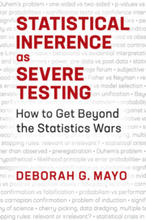“Statistical Inference as Severe Testing: How it Gets You Beyond the Statistics Wars,” Deborah G. Mayo, Virginia Tech

QUANTITATIVE RESEARCH METHODS WORKSHOP
Abstract: High-profile failures of replication in the social and biological sciences underwrites a minimal requirement of evidence: If little or nothing has been done to rule out flaws in inferring a claim, then it has not passed a severe test. A claim is severely tested to the extent it has been subjected to and passes a test that probably would have found flaws, were they present. This minimal severe-testing requirement leads to reformulating significance tests (and related methods) to avoid familiar criticisms and abuses. Viewing statistical inference as severe testing–whether or not you accept it–offers a key to understand and get beyond the statistics wars.
Deborah G. Mayo is Professor Emerita in the Department of Philosophy at Virginia Tech and is a visiting professor at the London School of Economics and Political Science, Centre for the Philosophy of Natural and Social Science. She is the author of Error and the Growth of Experimental Knowledge (Chicago, 1996), which won the 1998 Lakatos Prize awarded to the most outstanding contribution to the philosophy of science during the previous six years. She co-edited Error and Inference: Recent Exchanges on Experimental Reasoning, Reliability, and the Objectivity and Rationality of Science (CUP, 2010) with Aris Spanos, and has published widely in the philosophy of science, statistics, and experimental inference. She will co-direct a summer seminar on Philosophy of Statistics, intended for philosophy and social science faculty and post docs, July 28-August, 2019.
This workshop series is being sponsored by the ISPS Center for the Study of American Politics and The Whitney and Betty MacMillan Center for International and Area Studies at Yale with support from the Edward J. and Dorothy Clarke Kempf Fund.